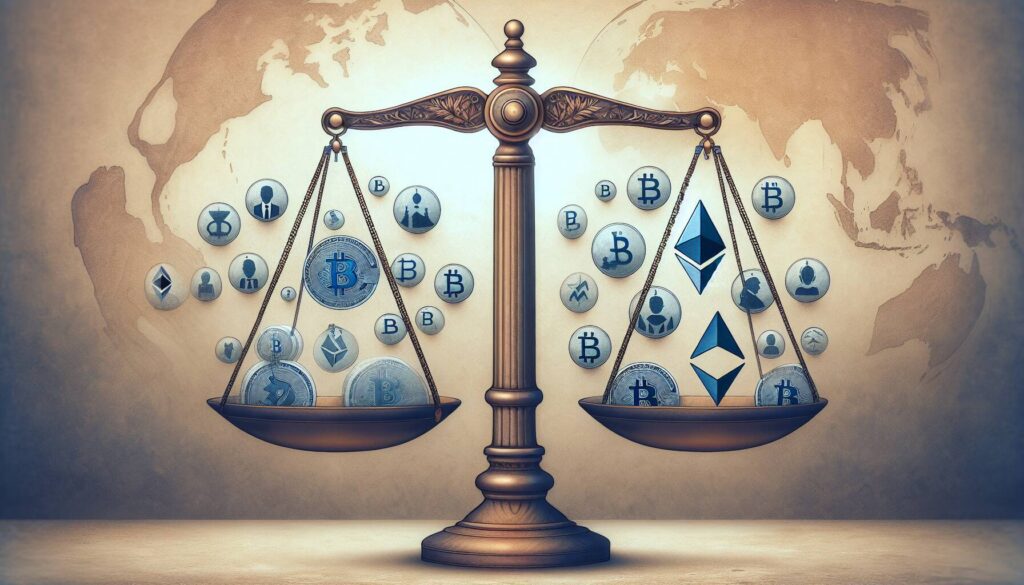In recent developments within the cryptocurrency arena, Bitcoin (BTC) has experienced a significant downturn, dropping over 5% in response to President Trump’s latest tariff announcement. Market analysts note that this decline is particularly disappointing for those who have been optimistic about Bitcoin’s potential as a safe haven or a reliable store of value, especially amid uncertainty in traditional markets.
“This moment feels like a turning point,” said Joel Kruger, a strategist at LMAX Group. He pointed out that while major stock indices like the Nasdaq and S&P 500 have slumped to their lowest levels in 2025, Bitcoin has managed to maintain a position well above its year-to-date bottom of $75,000, which some market technicians refer to as achieving “higher lows.”
However, views on Bitcoin’s role in times of economic turbulence remain divided. Javier Rodriguez Alarcon, chief commercial officer at crypto exchange XBTO, expressed skepticism regarding Bitcoin’s ability to serve as a counter to fluctuations in the dollar. In his assessment, there continues to be a noticeable correlation between digital assets like Bitcoin and broader risk markets, particularly during volatile periods.
“Despite talk that Bitcoin could act as a hedge against dollar-centric volatility, in practice we’re still seeing a strong correlation between digital assets and broader risk markets,” Rodriguez Alarcon commented.
Compounding these discussions, analysts at JPMorgan have weighed in, casting doubt on Bitcoin’s reputation as “digital gold.” They emphasized that gold remains the favored safe-haven asset, noting recent movements in the gold market, which has only dipped slightly to around $3,126 per ounce—still close to its record high. This aligns with their observation that gold could become the primary beneficiary of economic instability.
Even amidst Bitcoin’s recent struggles, its price remains above JPMorgan’s estimated average cost of production of $62,000, a number that historically has served as a lower boundary for the cryptocurrency’s market performance. As the financial landscape evolves, the interplay between Bitcoin, other digital assets, and traditional investments continues to capture the attention of market participants and analysts alike.

Impact of Bitcoin’s Recent Market Performance
Bitcoin’s fluctuating price and its relationship with traditional financial assets may significantly influence investors and market participants. Here are the key points related to this situation:
-
Market Reaction to Tariff Announcements:
Bitcoin has dropped over 5% following President Trump’s recent tariff announcement, demonstrating its connection to broader market movements. -
Perceived Store-of-Value:
Many investors are drawn to Bitcoin as a potential store-of-value amid economic uncertainty, as highlighted by Joel Kruger. -
Recent Market Trends:
Bitcoin currently holds above its year-to-date low of $75,000, which some analysts refer to as establishing “higher lows.” -
Creeping Correlation with Risk Assets:
Javier Rodriguez Alarcon points out the emerging correlation between Bitcoin and traditional risk markets, contradicting the notion of Bitcoin as a hedge against volatility. -
Gold as a Preferred Safe Haven:
JPMorgan analysts emphasize that gold remains the favored asset during economic downturns, raising concerns about Bitcoin’s narrative as “digital gold.” -
Production Cost Benchmark:
Bitcoin’s price remains above JPMorgan’s estimated production cost of $62,000, potentially serving as a critical price support level.
“The volatility and correlation with equities raises questions over Bitcoin’s ‘digital gold’ narrative.”
These points indicate that while Bitcoin may attract attention as an alternative asset, its dynamics with traditional markets and the perception of its value in uncertain times could have profound implications for investors’ strategies and decisions.
Bitcoin’s Struggles Amid Market Turmoil: A Comparative Analysis
The crypto landscape has taken a significant hit, particularly for bitcoin (BTC), which has experienced a downturn of over 5% following President Trump’s recent tariff declarations. This event has not only affected the traditional markets but has also rekindled debates regarding bitcoin’s role as a safe haven asset. While some analysts, like Joel Kruger from LMAX Group, highlight the cryptocurrency’s potential as a store-of-value asset, others, including Javier Rodriguez Alarcon from XBTO, contest this narrative, noting a strong correlation between crypto and conventional risk assets like equities.
One of the key advantages bitcoin holds over other assets, particularly when compared to gold, is its liquidity and accessibility. Bitcoin can be traded 24/7 across various platforms, making it an appealing option for investors looking to maneuver quickly in volatile market conditions. In contrast, gold trading is bound by market hours and often requires physical delivery for certain types of transactions. Furthermore, bitcoin’s decentralized nature appeals to a tech-savvy demographic that values autonomy and may distrust traditional financial institutions.
However, despite its advantages, bitcoin’s recent performance raises logical concerns. The volatility that defines it can deter some investors who prefer the stability offered by gold, especially during periods of economic uncertainty. As noted by JPMorgan’s Nikolaos Panigirtzoglou, gold maintains its status as the preferred safe haven, demonstrating resilience that bitcoin has yet to replicate consistently. Investors may feel more secure allocating their resources to gold, particularly as it rises amid the ongoing debasement trade.
The implications of this ongoing debate are considerable. On one hand, investors seeking diversification might still find bitcoin appealing but are reminded of its inherent risks. Conversely, traditionalists who view gold as the ultimate safe asset during turbulent times may further alienate themselves from the bitcoin narrative. The ongoing volatility and correlation with risk assets could force cryptocurrency enthusiasts to temper their bullish outlooks for the time being.
As the market continues to fluctuate, it’s clear that while bitcoin has a dedicated following, the competition from more established safe havens like gold remains fierce. Investors must weigh the potential benefits of including bitcoin in their portfolios against the backdrop of its current performance and market correlations. The choice between digital assets and traditional commodities will likely be a pivotal one for many as they navigate uncertain financial waters.

















